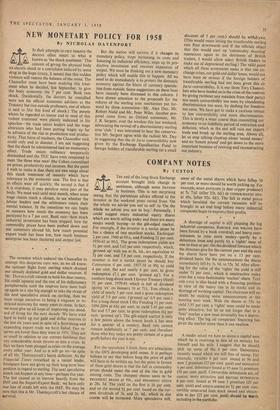NEW MONETARY POLICY FOR 1958
By NICHOLAS DAVENPORT The occasion which induced the Chancellor to attempt this desperate cure was, as we all know, the summer flight from sterling which drained our already depleted gold and dollar reserves. If Mr. Thorneycroft intends to hold his dear money, his credit squeeze and the rest of his deflationary paraphernalia until the reserves have been built up again to a size big enough to take the strain of the next speculative attack on sterling, then we must resign ourselves to being a stagnant or re- stricted economy for many years to come. In fact, we must give up all hope of improving our stand- ard of living for the next decade. We have tried hard to build up our gold and dollar reserves in the last six years and in spite of a flourishing and expanding export trade we have failed. Our re- serves are lower than they were in 1951. They are so small in relation to our current liabilities that any considerable drain throws us into a crisis. In fact we have been plunged in crisis on the average every other year. And so it will go on—in spite of all Mr. Thorneycroft's harsh deflation. As the Financial Times remarked in a recent leader, foreigners have not given up their long-term bear position in regard to sterling. The next speculative attack can happen at any time—perhaps this year. The last caused us to borrow heavily from the IMF and the Import-Export Bank: we have only one line of credit left with the IMF. We may be sure that this is Mr. Thorneycroft's last chance of survival. But the nation will survive if it changes its monetary policy, stops increasing its costs and lowering its industrial efficiency, steps up its pro- ductive investment and resumes expansion of output. We must be thinking out a new monetary policy which will enable this to happen. All we need to do immediately is to protect the domestic economy against the blasts of currency specula- tion from outside. Some suggestions on these lines have recently been discussed in this column. I have drawn attention to the proposals for the reform of the sterling area mechanism put for- ward by three economists—Mr. Alan Day, Mr. Robert Nield and Mr. Peter Wiles. Another pro- posal came from an Oxford economist, Mr. J. R. Sargent, over the wireless this last weekend, advocating the revival of a discriminatory sterling area 'club.' I was interested to hear the conserva- tive Mr. Sargent agree with the radical Mr. Day in suggesting that the de facto convertibility now given by the Exchange Equalisation Fund to foreign holders of transferable sterling (at a small discount of 1 per cent.) should be withdrawn. (This would mean letting the transferable sterling rate float downwards and if the officials object that this would start up 'commodity shunting' operations again to the detriment of British traders, 1 would allow select British traders to make use of depreciated sterling.) The valid point which all these economists make is that our ex- change crises, our gold and dollar losses, would not have been so serious if the foreign holders of transferable sterling had not been given this de facto convertibility. It is our three Tory Chancel- lors who have landed us in the crisis of the reserves by giving (without any mandate from their party) too much convertibility too soon by abandoning discrimination too soon, by dashing for freedom too soon. We have got to make a cautious retreat to less convertibility and more discrimination. This is surely a wiser course than committing our economy to an indefinite period of restriction and deflation, which in the end will ruin our export trade and break up the sterling area. Above all, let us stop talking claptrap about 'sound money' and an 'honest pound' and get down to the more important business of reviving and reconstructing our industry.










































 Previous page
Previous page